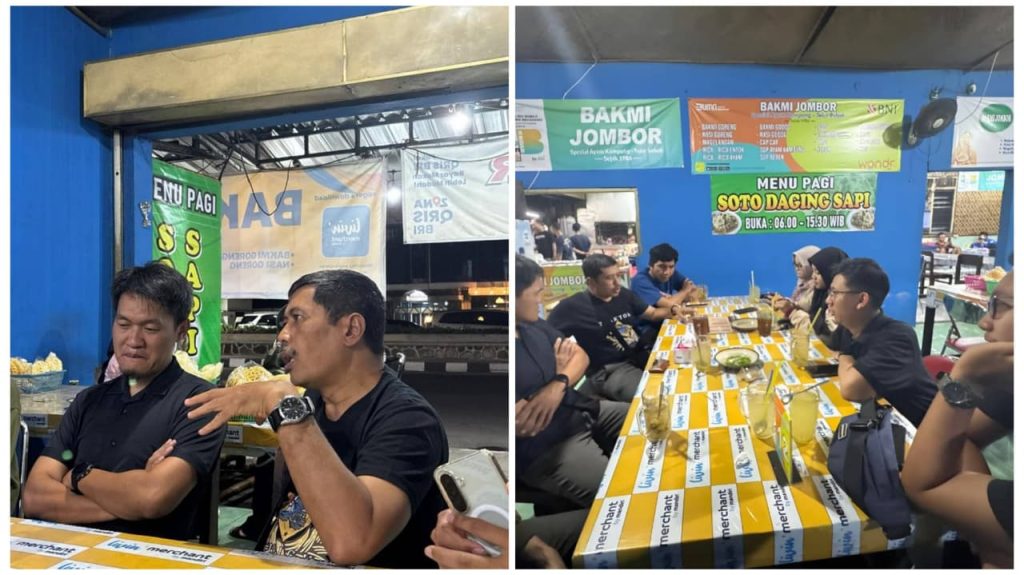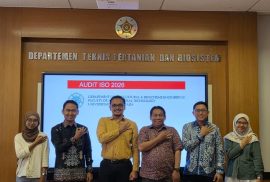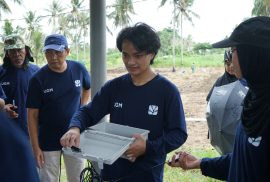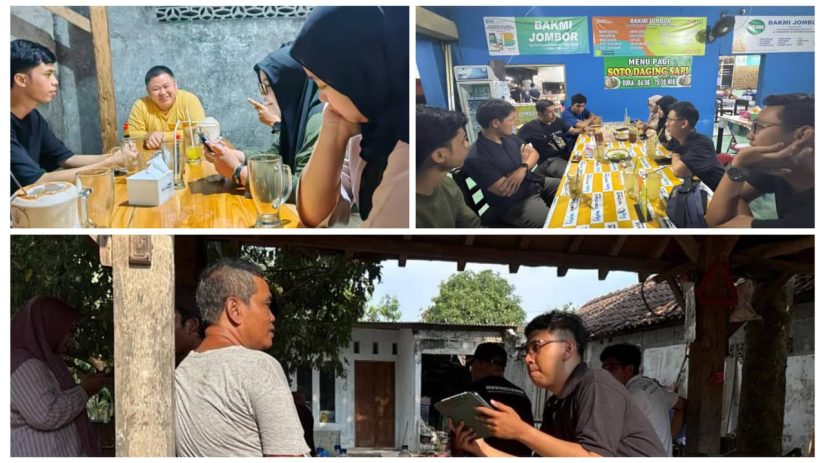
Yogyakarta, October 2025 — The Department of Agricultural and Biosystems Engineering, Faculty of Agricultural Technology, Universitas Gadjah Mada (DTPB FTP UGM), conducted a series of field data collection activities as part of the formulation of the Agricultural Machinery (Alsintan) Road Map.
The activity involved multiple stakeholders, including farmer groups, industry representatives, and agricultural technology practitioners. Field activities were carried out through in-depth interviews and discussions with both end users and industry actors, including:
-
Mr. Didik Purwadi, Mr. Warsita, Mr. Hartaya, and Mr. Jaimin (UPJA Taju Jawa Prambanan), on Tuesday, October 7, 2025, from 12.00–16.00 WIB;
-
Mr. Harry Kasuma Aliwarga (Mr. Kiwi), Co-founder of Frog Indonesia, on Sunday, October 12, 2025, from 18.00–21.00 WIB; and
-
Mr. Wawan Kartika Hadi, representative of CV Karya Hidup Sentosa (QUICK Tractor), and Mr. Luthfi Dinsaputro from PT Madu Baru, on Tuesday, October 14, 2025, from 19.00–21.00 WIB.
Dynamics and Challenges at the Farmer Level
During the visit to UPJA Taju Jawa Prambanan, the farmer group leaders shared various changes that occurred following the decline of the tobacco industry in their area.
According to Mr. Didik Purwadi, the region that once depended heavily on tobacco has gradually shifted toward horticultural crops and rice cultivation, adjusting to the availability of irrigation and land capacity.
“In the past, during the golden era of tobacco, twenty families could make a living just from it. Now, it’s gone. Farmers are looking for new commodities that could be as iconic as tobacco,” said Mr. Didik.
He also highlighted the challenges in managing the Agricultural Machinery Service Unit (UPJA), noting that many farmers are reluctant to own agricultural machines individually due to limited capital and the complexity of maintenance.
“UPJA management involves many aspects—from operations and maintenance to administration. Not all farmers are ready to handle that, so most prefer renting,” he added.
The discussion also revealed that government aid programs do not always align with field needs. Some distributed equipment, such as water pumps or tractors, often goes unused because their specifications are not suitable for local conditions.
“Sometimes, those who don’t get aid continue operating, while those who do end up leaving the machines idle,” one group leader remarked.
Farmers emphasized that agricultural modernization must go hand in hand with continuous technical assistance and training to ensure that distributed equipment effectively improves productivity and efficiency in the field.
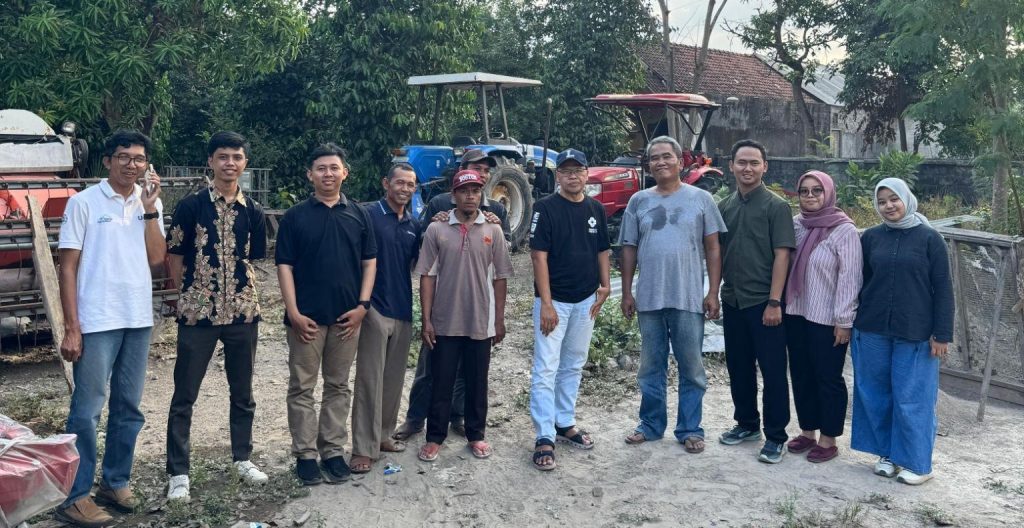
Industry Perspectives: Regulation Harmonization, Domestic Component Challenges, and Plantation Synergy
In discussions with Mr. Wawan Kartika Hadi (CV Karya Hidup Sentosa – QUICK Tractor) and Mr. Luthfi Dinsaputro (PT Madu Baru), several strategic issues were explored, including the harmonization of agricultural machinery policies, the implementation of Domestic Component Level (TKDN), and collaboration between manufacturing industries and the plantation sector.
Mr. Wawan explained that overlapping regulations among ministries—such as the Ministry of Industry, Ministry of Agriculture, and Ministry of Trade—remain one of the main barriers to strengthening domestic industry.
“The certification process for agricultural machinery is complicated. There are three key aspects—TKDN, SNI, and trademarks—all with different regulations and validity periods, yet all required for the same product,” said Mr. Wawan.
He also noted that the newly issued Minister of Industry Regulation No. 35/2025 introduces updated procedures for calculating TKDN and the Company Benefit Weight (BMP), aimed at improving transparency and reducing potential inconsistencies among surveyors.
“The new regulation provides more clarity, but consistent supervision is still needed to ensure uniform TKDN assessment across institutions,” he added.
Meanwhile, Mr. Luthfi Dinsaputro from PT Madu Baru emphasized the importance of synergy between agricultural machinery manufacturers and the plantation and sugar industries.
According to him, the equipment requirements in the sugarcane sector are highly specific—ranging from planting and harvesting machinery to raw material transport systems—yet these needs are often overlooked in national policies.
“Machinery for plantation crops like sugarcane is very specialized. Collaboration between agricultural machinery industries and sugar mills is essential to ensure that innovations are applicable and beneficial,” he stated.
He further stressed the need for technology transfer and applied research to bridge the gap between field demands and domestic manufacturing capabilities.
“We need research that starts from real industrial and field problems so that domestic products can compete and function optimally,” he added.
Both speakers also highlighted the need for cross-ministerial coordination, ensuring that industrial policies align with agricultural and trade policies, and jointly promote national self-reliance in agricultural machinery technology.
Technology and Data-Driven Agriculture: Insights from the Tech Industry
In the meeting with Mr. Kiwi Aliwarga, Co-founder of Frog Indonesia, discussions focused on the future of data-driven and automated agriculture in Indonesia.
He noted that the direction of the agricultural industry will increasingly rely on the integration of IoT (Internet of Things), automation, and artificial intelligence (AI).
“In the next five to ten years, agriculture will move toward autonomous and robotic systems—fully automated and data-driven,” explained Mr. Kiwi.
As an agritech company, Frog Indonesia develops innovations such as smart farming systems, data-based seed breeding, and ecosystem-specific organic fertilizers.
According to Mr. Kiwi, the biggest challenge lies not in the technology itself, but in the availability and accuracy of agricultural data, which form the foundation of national decision-making.
“Inaccurate data can lead to misguided policies. That’s why reliable data must become the backbone of future agricultural systems,” he emphasized.
Towards a Data-Driven and Locally Adaptive Mechanization Road Map
The field data collection initiative forms a crucial part of developing an evidence-based Agricultural Machinery (Alsintan) Road Map.
Insights gathered from farmers, technology developers, and manufacturers reveal that the future direction of national agricultural mechanization should focus on:
-
Enhancing the local adaptability of technology, including irrigation, crop types, and land conditions;
-
Strengthening human resource capacity through continuous technical training;
-
Integrating data-driven technologies to improve efficiency and policy precision; and
-
Promoting cross-ministerial harmonization to reinforce national agricultural machinery industries.
Through this initiative, DTPB FTP UGM reaffirms its role as a facilitator of research and cross-sector collaboration to drive the realization of adaptive, inclusive, and sustainable agricultural mechanization in Indonesia.


